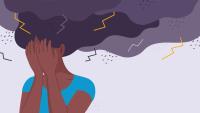Moving Past Fear of Health Care After Illness

Fear is not always motivating. After a heart attack or stroke, many people become afraid of change, afraid of medical care, and afraid of the sensations of their own body, fears that hinder the adoption of healthy new behaviors that can prevent another serious illness.
At the Roybal Center for Fearless Behavior Change at VP&S, Ian Kronish, MD, associate professor of medicine, is trying to find the best ways to help survivors get past their fears and live healthier, longer lives.
When people experience a frightening event such as a heart attack or stroke, fear responses, also known as the fight-or-flight system, get activated. This system is helpful for dealing with acute stress, says Dr. Kronish, director of the center, but can become maladaptive if the stress lasts, leading to heightened fear, anxiety, and distress or PTSD.
These reactions to health scares are common. About 1 in 8 people who visit the hospital with acute chest pain still have PTSD symptoms a month later, even if they did not have a heart attack. The statistics are higher for stroke and cardiac arrest survivors: 1 in 4 stroke survivors and 1 in 3 cardiac arrest survivors have PTSD symptoms a month later. Also, 1 in 3 patients who have been hospitalized in ICUs have lingering PTSD symptoms.
Various approaches to alleviating fear are being tested at the center. “In one study, patients do light physical activity under the guidance of a counselor to learn to not be fearful of an increase in heart rate and other normal reactions to exercise and become better at determining which sensations are concerning and which are not,” says Dr. Kronish.
Several pilot studies are underway that use the internet and smartphone apps to deliver behavioral therapy and mindfulness training. This type of treatment has the added benefit of helping patients who may be afraid to visit a doctor’s office.
But finding the right way to approach patients who might need help in overcoming their fears is difficult. “Many patients do not think of themselves as having a psychological problem and many wish to avoid reminders of their traumatic event,” Dr. Kronish says.
And sometimes it’s the patient’s loved ones who need some help. “Cardiac arrest patients may not remember the initial event. It is their loved ones who witnessed the event and who can be the most emotionally affected,” Dr. Kronish says. “And they can transmit their fears onto patients as the patient is recovering. If we can help reduce the fear in family members, we can help patients too.”
The techniques developed by the center also have the potential to help patients who have chronic pain. The center is testing a new treatment for chronic pain called “pain reprocessing therapy” to help reduce the fear of physical activity in patients with back pain. Some patients experience complete relief from their back pain after just a few sessions.
“Fear can get in the way of developing healthy behaviors in many situations,” Dr. Kronish says. “It does not just occur in the setting of life-threatening medical events.”
To learn more about studies open to new participants, visit the Roybal Center.